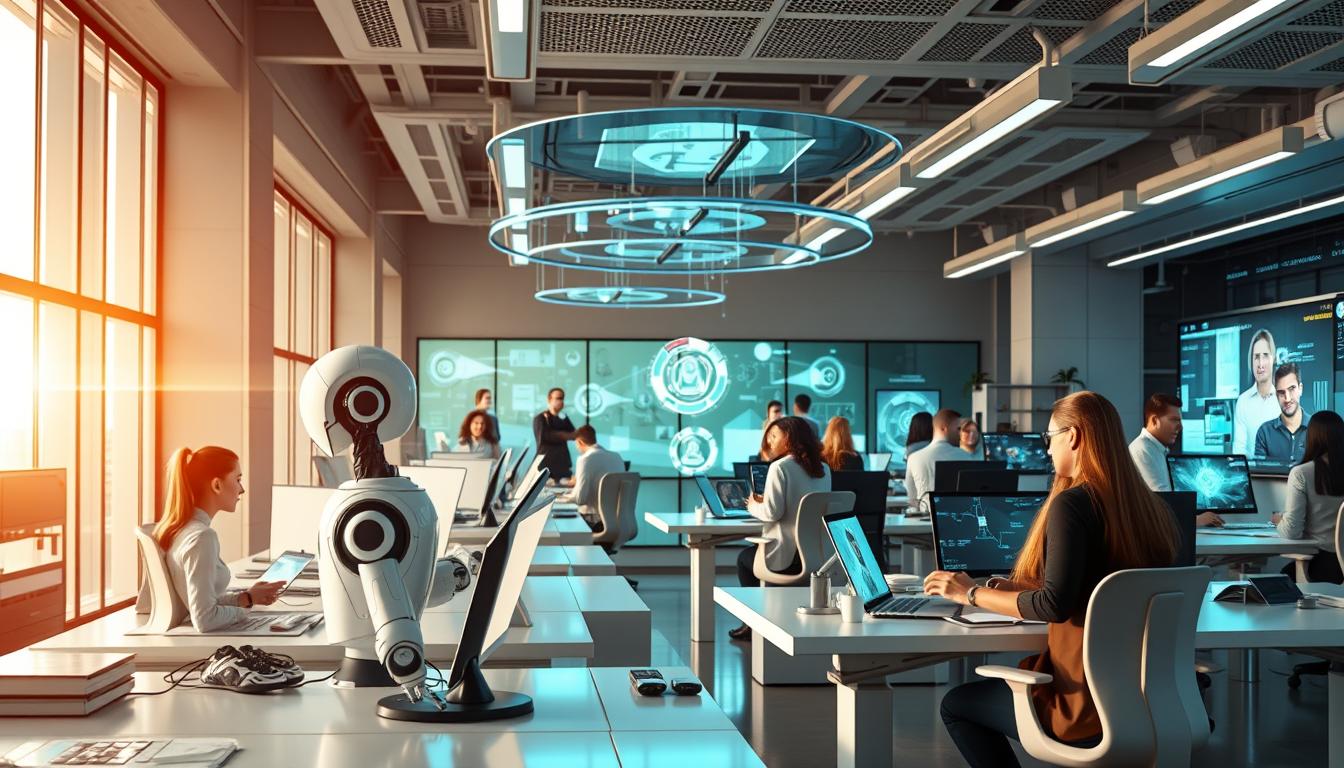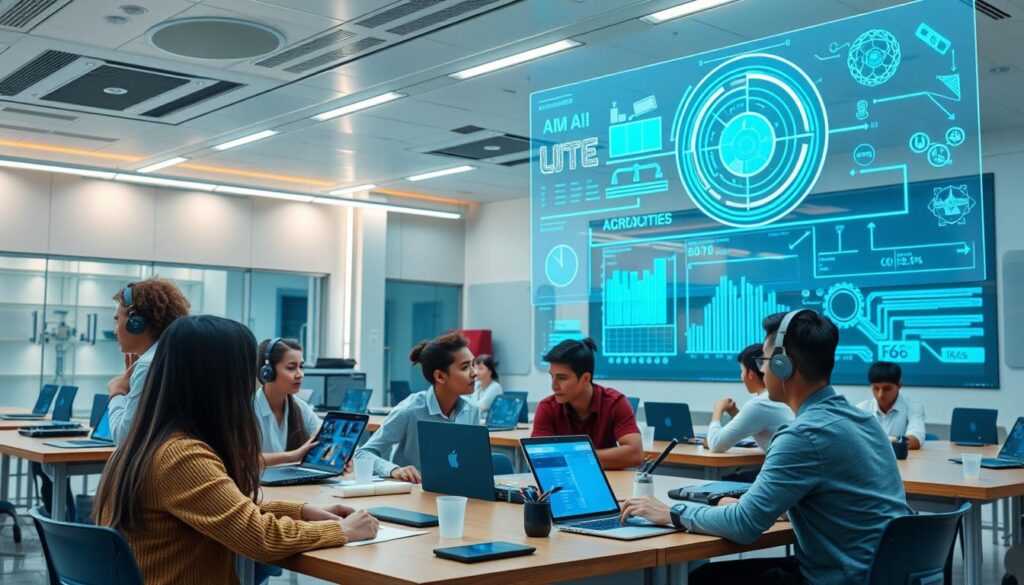The Future of Work: How Tech is Reshaping the Job Market

Table of Content
In Sydney, a young software engineer named Liam was starting a new chapter in his career. He was at the edge of a big change in the job world. This change was brought about by new technologies like artificial intelligence (AI).
Liam’s story shows how AI and automation are changing jobs in Australia. These changes are creating new roles and requiring different skills. The future of work is changing fast, and we all need to be ready.
Key Takeaways
- The Australian job market is undergoing a major transformation driven by the rapid advancement of AI and automation.
- Emerging AI-powered roles are reshaping the employment landscape, creating new career paths in areas like machine learning and data science.
- Continuous learning and upskilling are crucial for individuals to stay competitive in the evolving job market.
- Flexible work arrangements, such as the gig economy, are becoming more prevalent, offering Australians new ways to earn a living.
- Ethical considerations and governance around the use of AI in the workplace must be addressed to ensure a responsible and inclusive future of work.
Rise of Artificial Intelligence and Automation
Australia is leading a big change in technology, thanks to artificial intelligence (AI) and machine learning. These new technologies are changing how we work. They are creating more ai jobs and machine learning careers.
AI and Machine Learning Transforming Industries
AI and machine learning are changing many fields, like healthcare and finance. Hospitals use AI to help patients, and banks use it to fight fraud. These changes are making work more efficient and data-driven.
Automation Disrupting Traditional Job Roles
The automation workforce is also changing jobs in Australia. Robots and smart systems are doing simple tasks, changing old jobs. This change brings both challenges and new chances for workers.
As AI and automation grow, the job world is changing. People need to be ready to adapt and find new ai jobs and machine learning careers. This will help them succeed in Australia’s evolving job market.
“The future is already here – it’s just not very evenly distributed.”
– William Gibson, Novelist
AI jobs: Emerging Careers in the Tech Landscape
Artificial intelligence (AI) is changing the job market in Australia. Now, there are many new career paths in tech. These include ai engineering roles, data science vocations, and cognitive computing professions. You can also find jobs in algorithmic jobs, neural network occupations, and intelligent systems careers.
The role of AI engineer is very popular. These experts design and build AI systems to solve big business problems. They know a lot about machine learning, neural networks, and data.
Data science is another growing field. People in this field use advanced analytics and programming to find insights in big data. They help make AI decisions in many industries.
If you’re interested in how AI works with our brains, cognitive computing professions might be for you. These experts create systems that can understand and interact with humans in a natural way.
| AI-Related Roles | Key Skills | Projected Growth |
|---|---|---|
| AI Engineer | Machine Learning, Neural Networks, Data Processing | Exponential |
| Data Scientist | Advanced Analytics, Statistical Modelling, Programming | Rapid |
| Cognitive Computing Specialist | Natural Language Processing, Human-Computer Interaction, Contextual Reasoning | Significant |
As AI becomes more important, these new jobs show us what the future of work might look like.
Reskilling and Upskilling for the Future Workforce
Technological changes are fast, and the job market is shifting quickly. It’s crucial to keep learning and growing professionally. As more jobs in machine learning, AI, and data science become available, Australians need to be ready to learn and improve their skills.
Importance of Continuous Learning
The skills needed for today’s jobs are very different from the past. To stay ahead, Australians must be open to learning new things. This could mean taking online courses, going to workshops, or getting advanced degrees in new fields.
- Maintain relevance in the ever-evolving job market
- Acquire new skills to adapt to technological disruptions
- Enhance career prospects and earning potential
- Contribute to the growth of the Australian workforce
| Skill | Importance | Trend |
|---|---|---|
| Data Analysis | High | Increasing |
| Programming | High | Increasing |
| Critical Thinking | High | Increasing |
| Problem-Solving | High | Increasing |
“Continuous learning is not only a necessity for the future workforce, but it’s also a pathway to personal and professional growth. By embracing a mindset of lifelong learning, Australians can future-proof their careers and contribute to the nation’s economic prosperity.”
The Gig Economy and Flexible Work Arrangements
The Australian workforce is changing fast, thanks to the gig economy and smart systems like AI and automation. This change brings new chances and hurdles for everyone, as the old 9-to-5 job model is fading. Now, we see more flexible and on-demand work options.
The gig economy, with its short-term jobs or freelance work, is growing in many fields. Sites like Uber, Airtasker, and Upwork make it simple for people to find and do short-term, project-based jobs. AI helps match workers with jobs, offering flexibility that many Australians want.
But, the gig economy also brings worries about job security, benefits, and AI replacing old jobs. Employers face a tough task. They need to use the gig workforce’s agility and cost savings while making sure workers have fair and stable jobs in ai jobs, automation workforce, and intelligent systems careers.
| Advantages of Gig Work | Challenges of Gig Work |
|---|---|
|
|
As the job market in Australia changes, it’s key for workers and employers to adjust and see the benefits of the gig economy and flexible work. By tackling the challenges and using the advantages, we can all do well in this new tech-driven world.

Impact on Specific Industries and Sectors
Artificial intelligence (AI) and automation are changing many industries in Australia. Healthcare and finance are two areas seeing big changes.
Healthcare and Medical AI Applications
AI is changing healthcare by helping doctors diagnose and treat patients better. It uses predictive analytics for early disease detection and robotic surgeries. This makes medical care more efficient and accurate.
It also creates new ai jobs and machine learning careers. These jobs need people skilled in artificial intelligence employment and data science vocations.
AI in Finance and FinTech
In finance, AI is changing banking and investment. It automates tasks like credit checks and fraud detection. This makes banks work better.
Also, fintech companies use AI for better investment advice and wealth management. This creates new ai jobs and data science vocations.
| Industry | AI and Automation Applications | Emerging Careers |
|---|---|---|
| Healthcare |
|
|
| Finance and FinTech |
|
|
As AI and automation grow, so does the need for ai jobs, machine learning careers, and data science vocations. This offers exciting opportunities for those with the right skills and knowledge.
Ethical Considerations and AI Governance
Artificial intelligence (AI) is changing the Australian job market. It’s important to think about the ethics and governance of AI. AI in the workforce raises questions about fairness and accountability. It also worries about the possible negative effects on society.
It’s key to develop AI responsibly. This ensures AI jobs, artificial intelligence employment, and intelligent systems careers help everyone. We need clear rules for AI decisions, to avoid biases, and protect privacy and data.
- AI systems should not make existing biases worse, like gender or race biases.
- We need clear rules for using AI at work, like monitoring and making decisions with algorithms.
- Working together, the government and private sector should create ethical AI rules that keep up with AI’s fast growth.
The Australian government and leaders must focus on AI’s ethics. They should aim for a future where ai jobs, artificial intelligence employment, and intelligent systems careers are fair, open, and improve society.
“The true test of the morality of a society is how it treats its most vulnerable members.”
Future-Proofing Strategies for Career Longevity
In today’s fast-changing tech world, careers in machine learning, data science, and cognitive computing are on the rise. To stay ahead, it’s crucial to develop soft skills and emotional intelligence. These human abilities can work alongside AI and automation.
Cultivating Soft Skills and Emotional Intelligence
Algorithmic jobs and neural network occupations are becoming more common. Employers now value human skills like communication, critical thinking, and problem-solving. These skills are hard for machines to replicate.
Being able to understand and manage emotions, empathize, and work well with others is key. Emotional intelligence helps in dealing with complex work situations, making smart decisions, and leading effectively. These traits are highly sought after in today’s automated world.
- Enhance communication skills to effectively collaborate with AI-powered systems and colleagues
- Develop critical thinking and problem-solving abilities to tackle novel challenges
- Cultivate adaptability and resilience to embrace the constantly evolving technological landscape
- Strengthen emotional intelligence to navigate the human aspects of the workplace
By focusing on these soft skills and emotional intelligence, professionals can secure their place in the future. They will remain valuable in the ever-changing job market.
“The future belongs to a different kind of person with a different kind of mind: artists, inventors, storytellers-creative and empathetic ‘right-brain’ thinkers whose abilities mark the fault line between who gets ahead and who doesn’t.”
– Daniel H. Pink, author of “A Whole New Mind”
The Role of Education and Training Institutions
Australia is facing fast changes in ai jobs, machine learning careers, and artificial intelligence employment. Education and training institutions are key in preparing the workforce for these changes. They focus on data science vocations and cognitive computing professions that will define the future.
Universities and vocational training centres are updating their courses. They aim to give students the skills needed for an AI-driven economy. This includes special machine learning careers courses and artificial intelligence employment modules in various degrees.
It’s also important for academia and industry to work together. Partnerships between schools and tech companies have led to new training programs. These programs offer practical experience in ai jobs and data science vocations.
| Institution | Program | Focus |
|---|---|---|
| University of Sydney | Master of Data Science | Data science vocations, machine learning, big data analytics |
| RMIT University | Bachelor of Computer Science (Artificial Intelligence) | Artificial intelligence employment, robotics, natural language processing |
| Deakin University | Graduate Certificate in Applied Artificial Intelligence | Ai jobs, predictive analytics, computer vision |
The future of cognitive computing professions is changing fast. Australia’s education and training institutions must adapt quickly. Their efforts will shape the future workforce and keep Australia competitive in the tech world.

Collaborative Human-Machine Partnerships
The future of work in Australia is changing fast. This change is thanks to the growth of automation and intelligent systems. Now, ai jobs and neural network occupations are working together to make humans better at what they do.
Augmenting Human Capabilities with AI
Instead of fearing ai jobs taking over, we’re seeing a new partnership between humans and technology. Intelligent systems are being made to help and improve what humans can do. This means people can solve complex problems more efficiently and accurately.
By using AI and automation, Australian workers can do away with boring tasks. This lets them focus on creative problem-solving and strategic thinking. This way, they can be more productive and happy at work, using their skills to make a real difference.
| Human Strengths | AI Capabilities |
|---|---|
| Creative Thinking | Data Analysis |
| Emotional Intelligence | Rapid Information Processing |
| Strategic Decision-Making | Scalable Automation |
As Australians work together with AI, the future of work looks bright. It’s a mix of human creativity and artificial intelligence. This partnership will lead to more innovation, productivity, and job satisfaction.
Adapting to the Changing Workplace Culture
In Australia, workplaces are changing with AI and automation. Employees need to learn new ways to work with smart systems. Managers must create an environment that supports creativity and skills that AI can’t replace.
The introduction of AI and automation is changing how we manage. Australian companies are looking at new ways to evaluate work, assign tasks, and train staff. Skills like emotional intelligence and problem-solving are now key for success in AI jobs.
Changing how we work needs a mindset shift, not just for employees but for the whole company. Leaders should promote learning, open talk, and teamwork. This way, Australian workplaces can use AI and automation to their advantage, preparing for the future.










